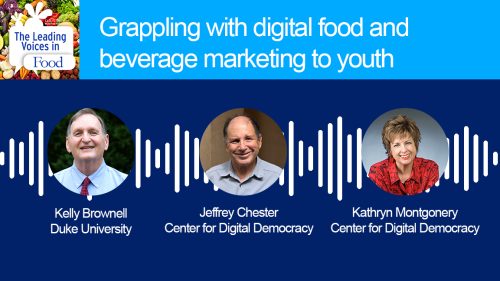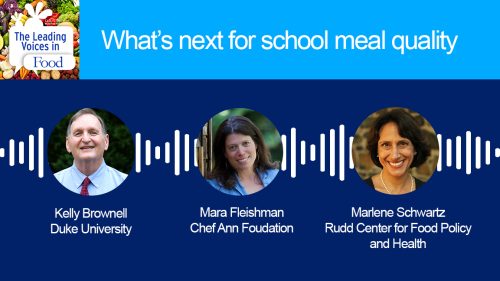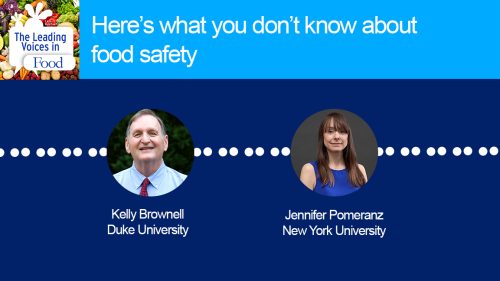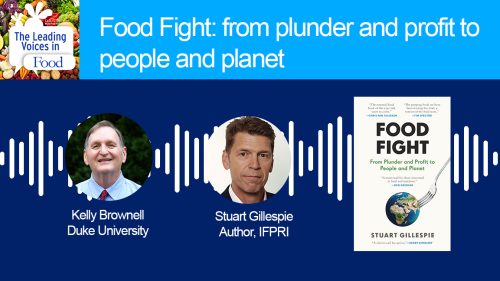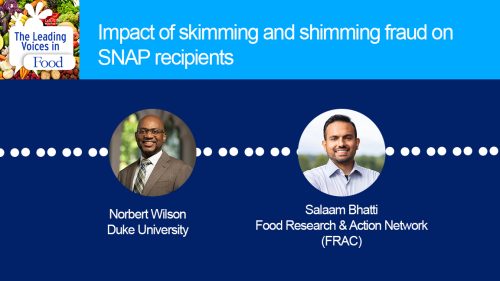The Leading Voices in Food
E134: How Big Data is Fueling Youth Obesity
America’s children and teenagers spend tremendous amount of time on the internet and never more than during the Coronavirus pandemic, with families at home so much, people ordered food, got news and engaged with family and friends online. Youngsters whose schools closed relied on YouTube for educational videos, attended virtual classes on Zoom and to Google Classroom and flocked to TikTok, Snapchat and Instagram for entertainment and social interaction. The cost of digital immersion has a serious health downside however, because the nation’s youth have been exposed to a steady flow of marketing for fast foods, soft drinks, and other unhealthy products. Today we’ll be discussing a new report from the Center For Digital Democracy entitled, “Big Food, Big Tech, and the Global Childhood Obesity Pandemic.”
Subscribe: Apple Podcasts | TuneIN | YouTube Music | SoundCloud | PocketCasts | Radio Public
Tags: Advocacy & Food | Child Development & Nutrition | Childhood Obesity | Diet & Nutrition | Food Policy |

Jeff Chester is Executive Director of the Center for Digital Democracy (CDD), a Washington, DC non-profit organization. CDD is one of the leading U.S. NGOs advocating for citizens, consumers and other stakeholders on digital privacy and consumer protections online. Founded in 1991, CDD (then known as the Center for Media Education) led the campaign for the enactment of the Children’s Online Privacy Protection Act (COPPA, 1998). During the 1990s it also played a prominent role in such issues as open access/network neutrality, diversity of media ownership, public interest policies for children and television, as well the development of the FCC’s “E-Rate” funding to ensure that schools and libraries had the resources to offer Internet services. A former investigative reporter, filmmaker and Jungian-oriented psychotherapist, Jeff Chester received his M.S.W. in Community Mental Health from U.C. Berkeley.
Kathryn Montgomery is Professor Emerita in the School of Communication at American University, where she founded and directed the 3-year interdisciplinary PhD program in Communication. She is also Senior Strategist for the Center for Digital Democracy (CDD). Montgomery’s research, writing, and testimony have helped frame the national public policy debate on a range of critical media issues. In the 90s, she spearheaded the campaign that led to passage of the U.S. Children’s Online Privacy Protection Act (COPPA). She is author of two books: Target: Prime Time – Advocacy Groups and the Struggle over Entertainment Television (Oxford University Press, 1989); and Generation Digital: Politics, Commerce, and Childhood in the Age of the Internet (MIT Press, 2007). Montgomery’s current research focuses on major technology, economic, and policy trends shaping the future of digital media in the Big Data era. Her recent work includes numerous reports and articles on digital food marketing, children’s privacy, health wearables, and political microtargeting. She earned a PhD in Film and Television Studies from the University of California, Los Angeles.
Interview Summary
Our guests today are Jeff Chester, Executive Director of the Center for Digital Democracy and Senior Strategist Kathryn Montgomery, both are dogged and their work on this topic and in my mind are true pioneers. So Jeff let’s begin with you, before we dig into the nuts and bolts of the report could you explain to our listeners the role that data play in online food and beverage marketing? What kinds of data are the companies collecting and how?
Well today you no longer can separate marketing and advertising from data, data collection, data analytics, and data use, whether you’re online doing any of the activities you just mentioned that kids were doing during the pandemic, where you go to the grocery store and use your loyalty card, go to the gas station, even pass a billboard, data about you is increasingly being collected, everything you do, everywhere you go, and not only you, what your family does and what your friends do and what your community does. All that is now collected and harvested. So personalized advertising can be delivered to you regardless of where you are and what you’re doing. And food and beverage companies have been in the forefront taking advantage of all this data to push very unhealthy food marketing to children and teens.
So Jeff you painted this picture of a lot of data being collected of a lot of people and so I’m assuming this applies to children as well as teenagers when they’re visiting the internet – that their data are being harvested and that gets used to market things specifically to them. So is that correct?
It works in a number of ways, even though there is a children’s privacy law that supposedly limits the amount of data that can be collected on children under 13. In fact, companies collect huge amounts of data, they violate the law on children, and certainly teens are easily accessible by the data companies, but it’s not just personal data, it’s data about their families. So for example, the companies now know what mom and dad buy at the grocery store or the commercials even that the kids watch at home for example, when they’re viewing streaming video or just regular television, so all that data is compiled. Let’s talk about family data in addition to personal children’s data, that’s used to target advertising to them. What’s important in the report is that today the food and beverage companies have become kind of Google’s and Facebook’s, the food and beverage companies are now leading data companies as well, which illustrates how much they value and understand the role that data plays in targeting audiences today, not just the United States, but throughout the world.
It’s a very concerning picture, especially given that there is a law meant to protect this population that’s being violated. So we’ll come back a little bit later and talk about what might be done, but Kathy, how has the COVID-19 pandemic impacted the way children and teens are being exposed to this food and beverage advertised in the digital world?
First of all, we know that children are already online in huge numbers, and that they’re living their lives in this digital environment, they’re conducting their friendships, they’re interacting with people all over the world, using their mobile phones constantly, they are already in this digital ecosystem, as the industry likes to call it, 24/7. With the pandemic that was intensified, these young people were in greater numbers for a multiplicity of purposes. So they were perfect targets. They were in the crosshairs of the food industry and the tech industry constantly. And particularly for black and brown kids, this raises a lot of serious issues. And we also see some important intersections between the COVID-19 pandemic and the obesity pandemic, which is really one reason why we wrote this report. We wanted to have people understand how these two global pandemics are connected and that many of the young people who have been most at risk for COVID-19 have been those who suffer from childhood obesity and the related illnesses to that condition like diabetes, etc. These young people suffered from COVID and were more inclined to be very sick and sometimes die from it in greater numbers than other young people. And then at the same time, we have this huge pandemic of obesity that unfortunately in the US has fallen off of the public radar. That’s another reason why we wanted to raise this issue and let people know about it. But in terms of black and brown youth, they are really in the cross hairs of the food industry. They are more avid users of digital media, they’re on the gaming platforms in greater numbers, they’re fully immersed and they’re trendsetters for other young people. And the food companies have enlisted some of the icons of pop culture from these communities to promote some of the unhealthiest food you can imagine from fast food to sugar sweetened beverages and to do it through games, mobile technologies, every possible digital venue.
Let’s talk just a little bit more about that if you wouldn’t mind, Kathy. So one might think that on the internet kids are just gonna be seeing the ads that they would have seen if they were watching TV, it would be similar things, they’d be seeing the sugar beverage company advertising its products with some athlete or some music celebrity or something, but you’re painting a picture that’s a little more serious than that. There are clever things that are done, it comes in different forms on the internet that can be especially hard to note as advertising, tell us a little bit more about that.
Kathryn – For a lot of people who as you say might have an understanding of commercials on television which we all can see and we can all get outraged about, but it doesn’t work that way on the internet. The brands are really woven intricately into the inner relationships that young people have with digital culture. In gaming for example, you see brands woven into the so-called game play. It’s done in a way that is personalized to each game player. They can crop up in the middle of a particular part of the game, they can be offered as rewards or ways to enhance your character’s ability to fight a battle for example, or in some cases like with one of the Wendy’s campaigns, they’ve created entire games based on character, so that’s one example. And the other thing is that there’s a lot of influencer marketing in this environment where influencers on social media will promote our brand to all their followers. And it doesn’t look like advertising. It looks like recommendations, and it may be even more subtle than that.
Jeff – And unlike the commercials that many of us have grown up with, digital advertising is different, first place it learns about you. It learns what you like, what you do, how you respond, and it’s able to change increasingly in real time. So for example, an ad or marketing message that you might view on your mobile phone is going to look different. It’s going to be enhanced, adapted in some way. When you see the same ad, when you’re on a gaming platform or a streaming video platform, these ads are increasingly personalized. And the ability to constantly track you wherever you go and use that data to create very relevant, engaging real-time advertising, which of course has been tested, measuring whether or not it triggers your unconscious and emotional spheres is one of the reasons why this powerful medium needs to be regulated.
So Jeff, the issue of marketing targeted this specific groups came up earlier, does that happen in this context?
Digital advertising works on an individual basis, on a group basis, the ability to leverage all the data that’s collected today, and the fact that we live our lives in the pandemic enhanced that, on these digital platforms, enables the advertisers and marketers to create vast numbers of targeting categories. And also to understand that even if you don’t buy, let’s say junk food product X, that because of the habits of others who may have the same interest as you, but who do buy a junk product X, you’re a potential target. And then they can then focus on you, even if you’ve never shown any interest in this particular food product. So there’s just a growing number of ways to leverage data, to push unhealthy products, to young people that we’ve ever witnessed.
So I’m imagining that both the sheer amount of such marketing is of great concern, but also the fact that it’s so precisely targeted and data are being used so effectively in this context probably gives the company as much more punch for every dollar they spend or every minute they have of your attention. So this is especially concerning. So Kathryn, what can be done to limit children’s exposure to this type of marketing in the online world. And does the report make any specific recommendations in this regard?
We made a number of recommendations and we were so disheartened when we started this research that so little had been done recently, this was an issue that was discussed much more publicly. And a lot of us were involved in these efforts, not that many years ago where the concern about childhood obesity was really on the public agenda and companies were under some pressure to report to the Federal Trade Commission, for example, on how they were spending money to advertise to young people, and that has not happened in recent years. Interestingly, a lot of that has happened overseas. So in the EU countries, in the EU, generally in the UK and Latin America, there are stronger rules. And this issue is very much on the agenda. These are also global companies. So one of the things we’ve done in this report is to inform people about what’s going on globally and to see how we need to look at U.S. policy in the context of global trends and the rising concerns in other countries about this issue. We have a long list of things that we recommend to policymakers and to companies. We think that the tech companies, for example, have some responsibilities and they’ve not stepped up to the plate on these issues. They play a major role here in the way they set up systems to facilitate and enhance this kind of marketing in the same way they did with the election. And what we learned from controversies over the Cambridge Analytica scandal, for example, so companies can do things to restrict what marketers can do on their site. So for example, we’re very concerned that we need to do more to protect adolescents. They’re very vulnerable to this kind of marketing. They’re very much influenced by their peers. They have other kinds of vulnerabilities that make them particularly susceptible to the techniques that are used by digital marketers. We also believe that we need to look very closely at setting some clear standardized guidelines for what unhealthy food and beverages are. And I’ll tell you everything we found in our report was unhealthy, whether it’s the soft drinks or the French fries or the candies or the energy drinks that are commonly promoted aggressively on gaming platforms for example, we need to have clear guidelines about what can and can’t be promoted. And we also need to focus on brands because if you restrict a certain product, but you don’t restrict the brand, research has shown this causes young people to increase their consumption of unhealthy food. We list a whole bunch of techniques that are unfair and manipulative that needs to be addressed, particularly targeting black and brown youth. There needs to be a really clear focus on ensuring that is stopped.
So I’d like to ask Jeff in just a moment about some more of the policy implications for this and what might be feasible and effective in the context of what government can do. But Kathy, let me ask you one additional question. I know the food industry has for a number of years said, government doesn’t need to regulate us because we’ll regulate ourselves and they set up the children’s food and beverage advertising initiative, which was an industry sponsored organization that was supposed to protect children from the marketing of unhealthy food, what happened to that? And why isn’t that enough?
Kathryn – First of all they made sure that they only set up self-regulatory guidelines that applied to children under 12, not even 12 and under. So they’ve done nothing about adolescents at all. And they’ve been adamant about not wanting to do anything in terms of protecting adolescents. Most of the provisions focus on television, a few deal with digital, but not in a really adequate way. And generally what we see is there’s no enforcement, there’s no oversight. So you look at the techniques, you’ll see that really these marketers are getting away with murder.
Jeff – And that’s why the public health community and people who are concerned about public health and especially obesity need to start focusing on the food and beverage companies, as well as the platforms like Google and Facebook and take that snapshot because they are responsible for unleashing all these techniques, which we catalog. And until the industry feels the pressure, hopefully from regulators, these self-regulatory regimes will not in fact respond. What we found is not a secret. This is all known. And yet the people who were supposed to protect our nation’s youth from this unhealthy group marketing simply have their heads purposely stuck in the digital sand.
So Jeff, are you any more optimistic that the social media platforms will have more effective self-regulation than the food companies do?
We’re moving to a period of regulation, I think that the days of self-regulation are over, we have an unprecedented opportunity with the Federal Trade Commission now. President Biden has appointed someone who might be the most progressive champion of consumers and children and public health that we’ve had in decades. Her name is Lina Khan from Columbia University. She just took over a few weeks ago and we’re seeing really a major overhaul. Now the Federal Trade Commission, which has the power to examine the data practices and the marketing practices, especially when it comes to the children and young people. We have a real opportunity to have the FTC act In this regard, in Congress, there is bipartisan interest to strengthen the rules that protect both young people and teens from a number of these data collection practices, which would have a direct impact on the ability of the companies to advertise and market junk food to them. And we’re very helpful, right now we’re on a path to try to reign in the power of big food and big tech, but it’s certainly going to be an uphill battle. Too few people understand that the battlefield to protect young people’s health in terms of obesity is really online.
It’s nice to hear your optimism, that the FTC is one possible avenue for change. Are there other policy routes that might be effective? For example, can the states do anything on this level?
You are absolutely correct Kelly that the state attorney generals are taking a leading position in trying to break up Facebook and Google and Amazon really can and should play a role. The state of Ohio attorney general, a Republican has proposed that Google in essence, be declared a public utility, which would allow all kinds of regulation in state to protect the consumers, to protect the public. So, yes, there’s also opportunities at the state level and even perhaps at the municipal level, in terms of the regulation of broadband, for example, or wireless communications, question is, is there enough capacity and interest and frankly support within the public health advocacy and professional scholarly community to start doing some of these things, because there’s really just only a tiny handful of organizations working on this. And it’s still frankly, very under appreciated.


